Using C language add support for matching arbitrary numbers
Using C language, add support for matching arbitrary numbers of words, not just 5. (Hint: use malloc, and don\'t worry too much about memory efficiency).
#include
#include
#include
#include \"smp0_tests.h\"
#define LENGTH(s) (sizeof(s) / sizeof(*s))
/* Structures */
typedef struct {
char *word;
int counter;
} WordCountEntry;
int process_stream(WordCountEntry entries[], int entry_count)
{
short line_count = 0;
char buffer[30];
while (gets(buffer)) {
if (*buffer == \'.\')
break;
/* Compare against each entry */
int i = 0;
while (i < entry_count) {
if (!strcmp(entries[i].word, buffer))
entries[i].counter++;
i++;
}
line_count++;
}
return line_count;
}
void print_result(WordCountEntry entries[], int entry_count)
{
printf(\"Result:\ \");
while (entry_count-- > 0) {
printf(\"%s:%d\ \", entries->word, entries->counter);
}
}
void printHelp(const char *name)
{
printf(\"usage: %s [-h] ... \ \", name);
}
int main(int argc, char **argv)
{
const char *prog_name = *argv;
WordCountEntry entries[5];
int entryCount = 0;
/* Entry point for the testrunner program */
if (argc > 1 && !strcmp(argv[1], \"-test\")) {
run_smp0_tests(argc - 1, argv + 1);
return EXIT_SUCCESS;
}
while (*argv != NULL) {
if (**argv == \'-\') {
switch ((*argv)[1]) {
case \'h\':
printHelp(prog_name);
default:
printf(\"%s: Invalid option %s. Use -h for help.\ \",
prog_name, *argv);
}
} else {
if (entryCount < LENGTH(entries)) {
entries[entryCount].word = *argv;
entries[entryCount++].counter = 0;
}
}
argv++;
}
if (entryCount == 0) {
printf(\"%s: Please supply at least one word. Use -h for help.\ \",
prog_name);
return EXIT_FAILURE;
}
if (entryCount == 1) {
printf(\"Looking for a single word\ \");
} else {
printf(\"Looking for %d words\ \", entryCount);
}
process_stream(entries, entryCount);
print_result(entries, entryCount);
return EXIT_SUCCESS;
}
Here is the sm0_tests.h file code:
int run_smp0_tests(int argc, char **argv);
int main(int argc, char **argv);
Here is the sm0_tests.c code:
#define _GNU_SOURCE
#include
#undef _GNU_SOURCE
#include
#include
#include
#include \"testrunner.h\"
#include \"smp0_tests.h\"
#define quit_if(cond) do {if (cond) exit(EXIT_FAILURE);} while(0)
/* test of -h switch behavior (B3) */
int test_help_switch(int argc, char **argv)
{
char *args[] = {\"./main\", \"-h\", NULL};
FILE *out, *err, *tmp;
char buffer[100];
freopen(\"/dev/null\", \"r\", stdin);
freopen(\"smp0.out\", \"w\", stdout);
freopen(\"smp0.err\", \"w\", stderr);
quit_if(main(2, args) != EXIT_FAILURE);
fclose(stdout);
fclose(stderr);
out = fopen(\"smp0.out\", \"r\");
err = fopen(\"smp0.err\", \"r\");
if (fgets(buffer, 100, out) != NULL && !strncmp(buffer, \"usage:\", 6)) {
tmp = out;
}
else {
quit_if(fgets(buffer, 100, err) == NULL);
quit_if(strncmp(buffer, \"usage:\", 6));
tmp = err;
}
if (fgets(buffer, 100, tmp) != NULL) {
quit_if(!strcmp(buffer, \"./main: Invalid option -h. Use -h for help.\ \"));
}
fclose(out);
fclose(err);
return EXIT_SUCCESS;
}
/* test of basic functionality (B4, B5) */
int test_basic_functionality(int argc, char **argv)
{
char *args[] = {\"./main\", \"cat\", \"dog\", \"nap\", NULL};
char *result[] = {\"Looking for 3 words\ \",
\"Result:\ \",
\"cat:1\ \",
\"dog:0\ \",
\"nap:0\ \"};
FILE *out;
int i;
char buffer[100];
out = fopen(\"smp0.in\", \"w\");
fprintf(out, \"cat\ \");
fprintf(out, \".\ \");
fclose(out);
freopen(\"smp0.in\", \"r\", stdin);
freopen(\"smp0.out\", \"w\", stdout);
quit_if(main(4, args) != EXIT_SUCCESS);
fclose(stdin);
fclose(stdout);
out = fopen(\"smp0.out\", \"r\");
for (i = 0; i < 5; i++) {
quit_if(fgets(buffer, 100, out) == NULL);
quit_if(strcmp(buffer, result[i]));
}
fclose(out);
return EXIT_SUCCESS;
}
/* test of stderr output support (C1) */
int test_stderr_output(int argc, char **argv)
{
char *args[] = {\"./main\", \"-wrong\", NULL};
char *result[] = {\"./main: Invalid option -wrong. Use -h for help.\ \",
\"./main: Please supply at least one word. Use -h for help.\ \"};
FILE *err;
int i;
char buffer[100];
freopen(\"/dev/null\", \"r\", stdin);
freopen(\"/dev/null\", \"w\", stdout);
freopen(\"smp0.err\", \"w\", stderr);
quit_if(main(2, args) != EXIT_FAILURE);
fclose(stderr);
err = fopen(\"smp0.err\", \"r\");
for (i = 0; i < 2; i++) {
quit_if(fgets(buffer, 100, err) == NULL);
quit_if(strcmp(buffer, result[i]));
}
fclose(err);
return EXIT_SUCCESS;
}
/* test of -fFILENAME switch behavior (C2) */
int test_file_output(int argc, char **argv)
{
char *args[] = {\"./main\", \"-fsmp0.out\", \"cat\", \"dog\", \"nap\", NULL};
char *result[] = {\"Looking for 3 words\ \",
\"Result:\ \",
\"cat:1\ \",
\"dog:0\ \",
\"nap:0\ \"};
FILE *out;
int i;
char buffer[100];
out = fopen(\"smp0.in\", \"w\");
fprintf(out, \"cat\ \");
fprintf(out, \".\ \");
fclose(out);
freopen(\"/dev/null\", \"w\", stdout);
freopen(\"smp0.in\", \"r\", stdin);
quit_if(main(5, args) != EXIT_SUCCESS);
fflush(0);
quit_if((out = fopen(\"smp0.out\", \"r\")) == NULL);
for (i = 0; i < 5; i++) {
quit_if(fgets(buffer, 100, out) == NULL);
quit_if(strcmp(buffer, result[i]));
}
fclose(out);
return EXIT_SUCCESS;
}
/* test of supporting an arbitrary number of words (C3) */
int test_malloc(int argc, char **argv)
{
char *args[] = {\"./main\", \"cat\", \"dog\", \"nap\", \"c\", \"a\", \"t\", NULL};
char *result[] = {\"Looking for 6 words\ \",
\"Result:\ \",
\"cat:1\ \",
\"dog:0\ \",
\"nap:0\ \",
\"c:0\ \", \"a:0\ \", \"t:0\ \"};
FILE *out;
int i;
char buffer[100];
quit_if(system(\"grep malloc main.c > /dev/null\"));
out = fopen(\"smp0.in\", \"w\");
fprintf(out, \"cat\ \");
fprintf(out, \".\ \");
fclose(out);
freopen(\"smp0.in\", \"r\", stdin);
freopen(\"smp0.out\", \"w\", stdout);
quit_if(main(7, args) != EXIT_SUCCESS);
fclose(stdin);
fclose(stdout);
out = fopen(\"smp0.out\", \"r\");
for (i = 0; i < 8; i++) {
quit_if(fgets(buffer, 100, out) == NULL);
quit_if(strcmp(buffer, result[i]));
}
fclose(out);
return EXIT_SUCCESS;
}
/* test of fgets usage (C4) */
int test_fgets(int argc, char **argv)
{
quit_if(system(\"grep fgets main.c > /dev/null\"));
return EXIT_SUCCESS;
}
/* test of multiple words per line support (C5) */
int test_strtok(int argc, char **argv)
{
char *args[] = {\"./main\", \"cat\", \"dog\", \"nap\", NULL};
char *result[] = {\"Looking for 3 words\ \",
\"Result:\ \",
\"cat:1\ \",
\"dog:2\ \",
\"nap:1\ \"};
FILE *out;
int i;
char buffer[100];
out = fopen(\"smp0.in\", \"w\");
fprintf(out, \"cat\ \");
fprintf(out, \"dog dog nap\ \");
fprintf(out, \".\ \");
fclose(out);
freopen(\"smp0.in\", \"r\", stdin);
freopen(\"smp0.out\", \"w\", stdout);
quit_if(main(4, args) != EXIT_SUCCESS);
fclose(stdin);
fclose(stdout);
out = fopen(\"smp0.out\", \"r\");
for (i = 0; i < 5; i++) {
quit_if(fgets(buffer, 100, out) == NULL);
quit_if(strcmp(buffer, result[i]));
}
fclose(out);
return EXIT_SUCCESS;
}
void delete_temp_files()
{
unlink(\"smp0.in\");
unlink(\"smp0.out\");
unlink(\"smp0.err\");
}
/*
* Main entry point for SMP0 test harness
*/
int run_smp0_tests(int argc, char **argv)
{
/* Tests can be invoked by matching their name or their suite name
or \'all\'*/
testentry_t tests[] = {
{\"help_switch\", \"suite1\", test_help_switch},
{\"basic_functionality\", \"suite1\",
test_basic_functionality},
{\"stderr_output\", \"suite1\", test_stderr_output},
{\"file_output\", \"suite1\", test_file_output},
{\"malloc\", \"suite1\", test_malloc},
{\"fgets\", \"suite1\", test_fgets},
{\"strtok\", \"suite1\", test_strtok}};
atexit(delete_temp_files);
return run_testrunner(argc, argv, tests, sizeof(tests) / sizeof (testentry_t));
}
Solution
MAlloc is a function that is used to create a block of memory
as
where void refers to the return type of the expression and size represents the number of bytes needed simply a pool of memory
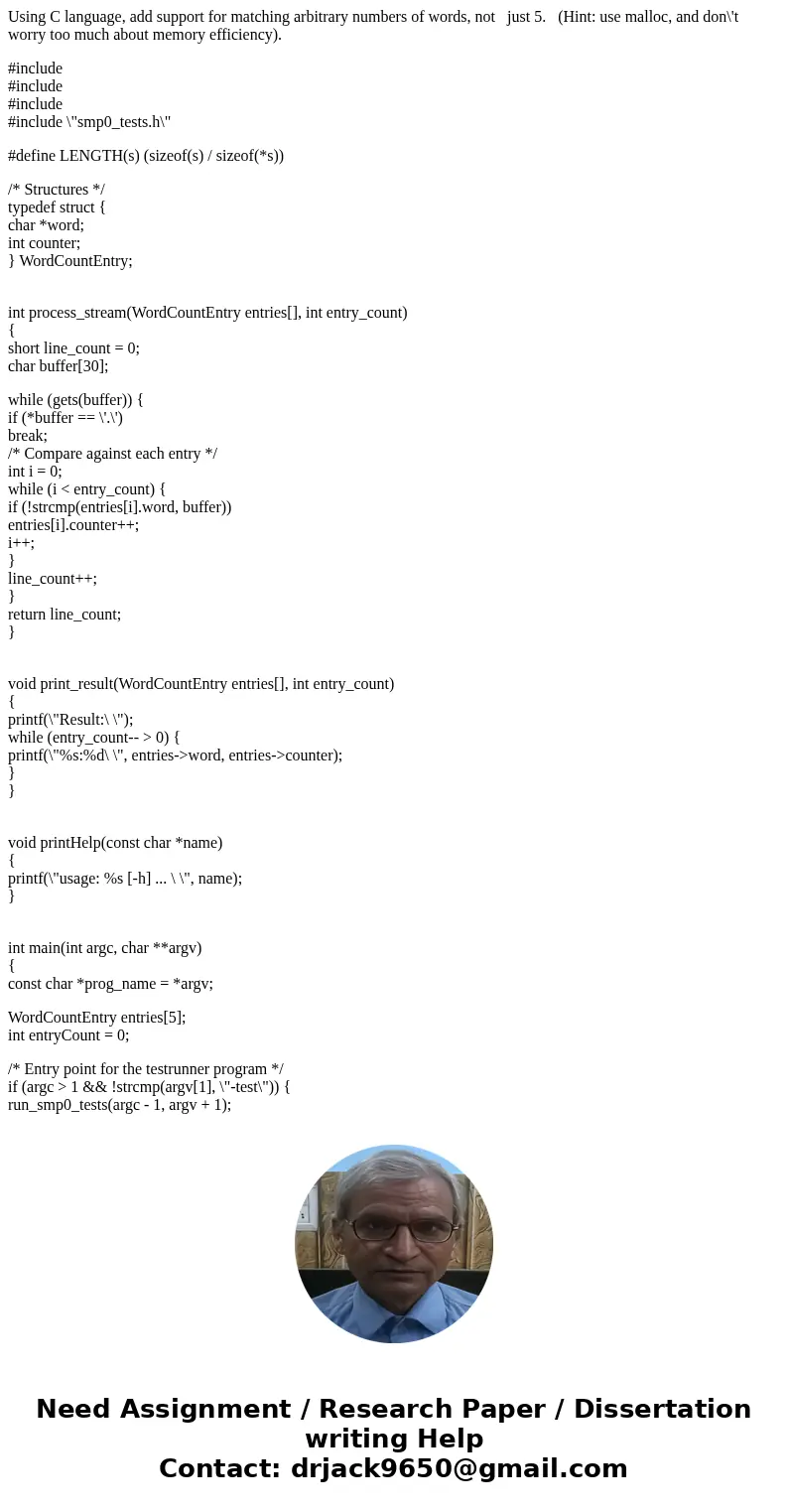
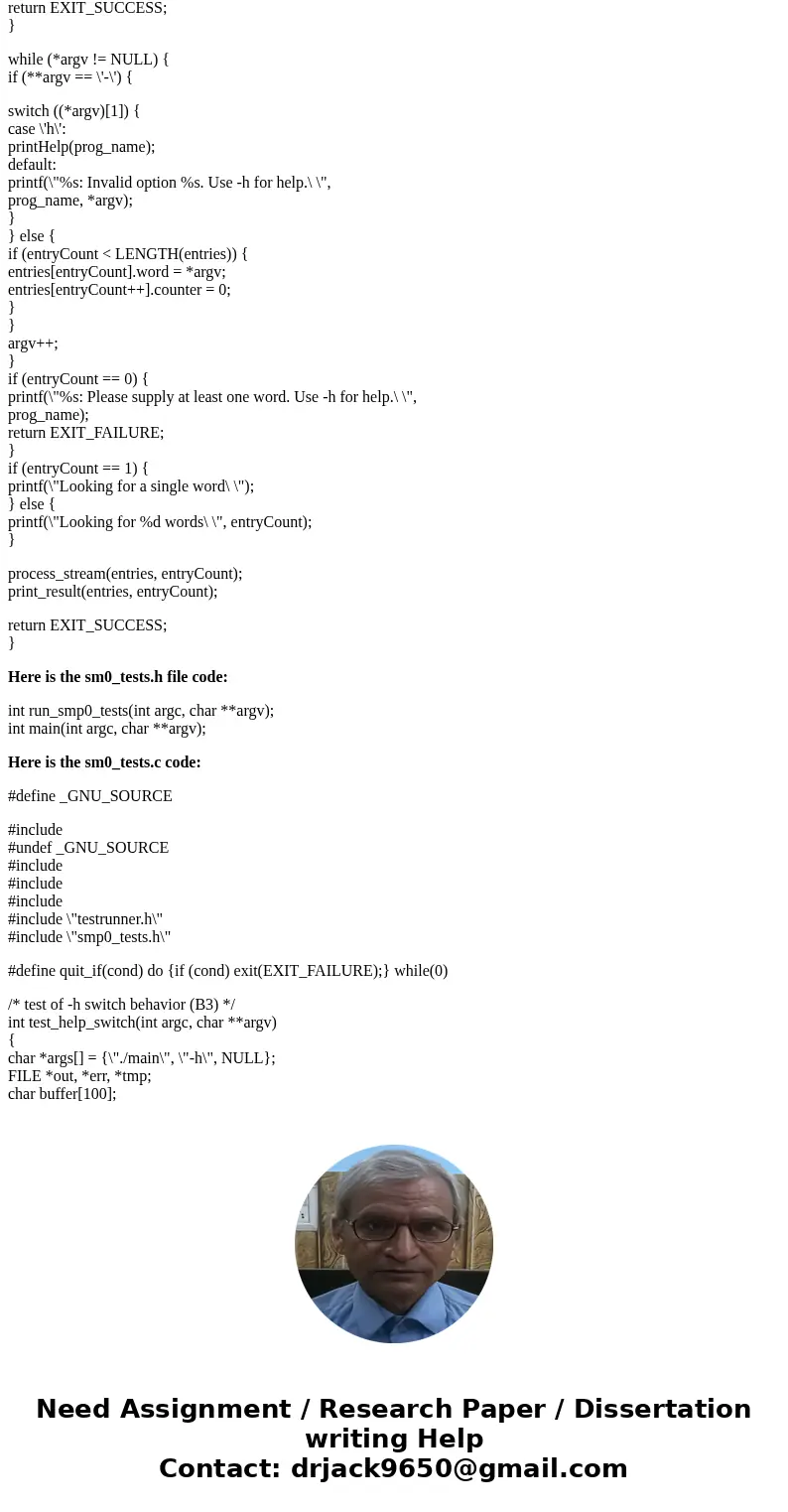
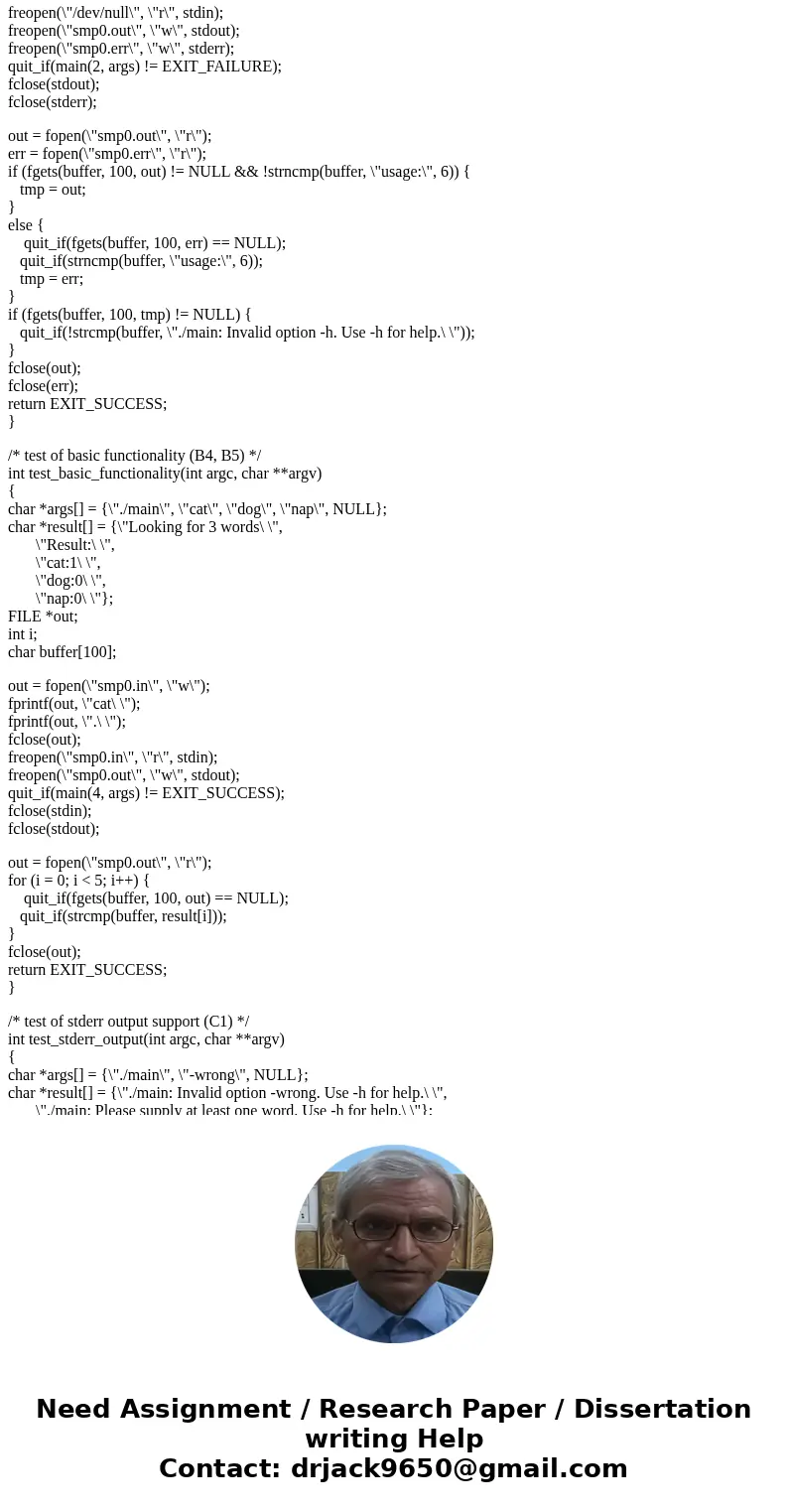
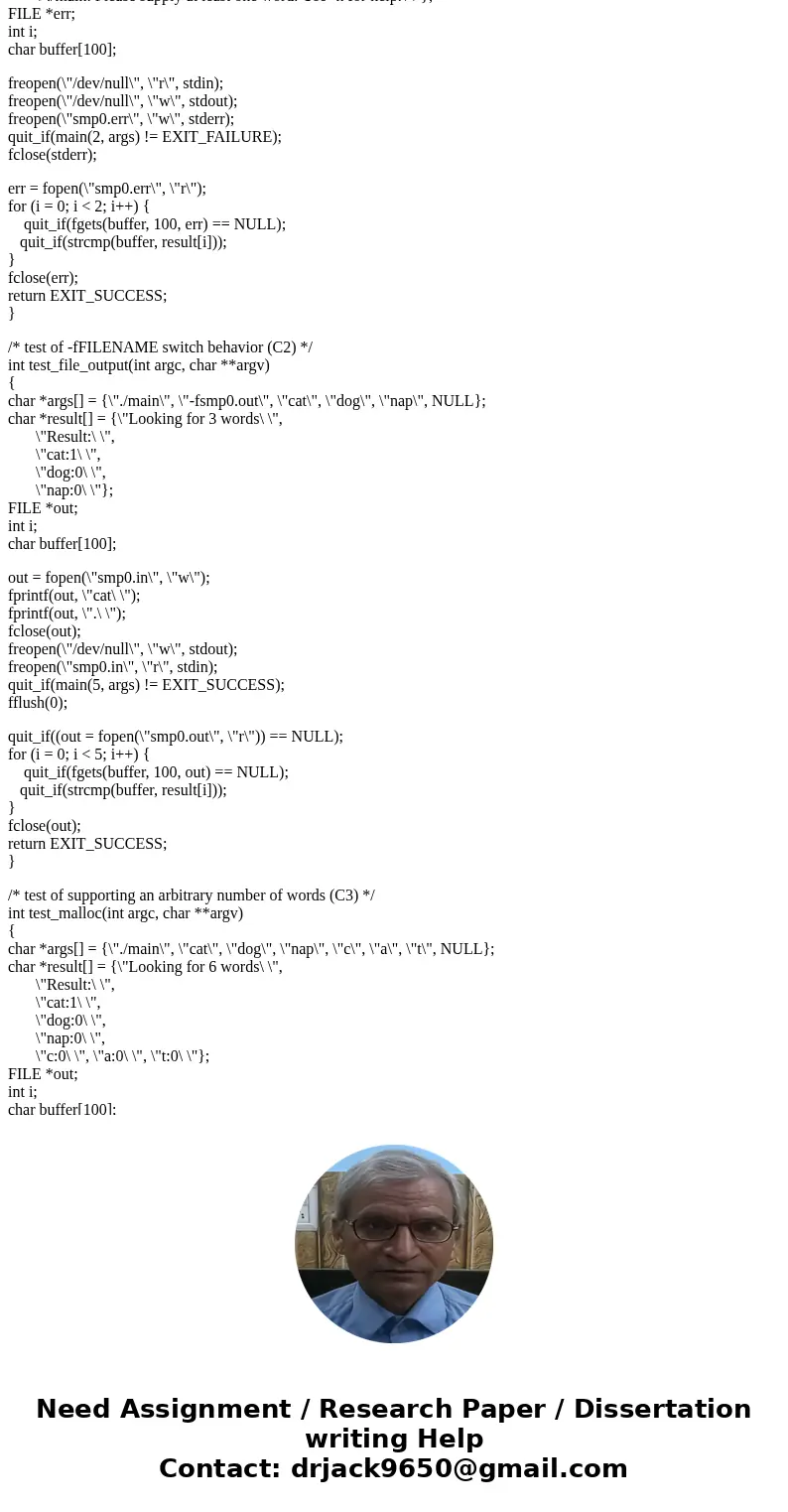
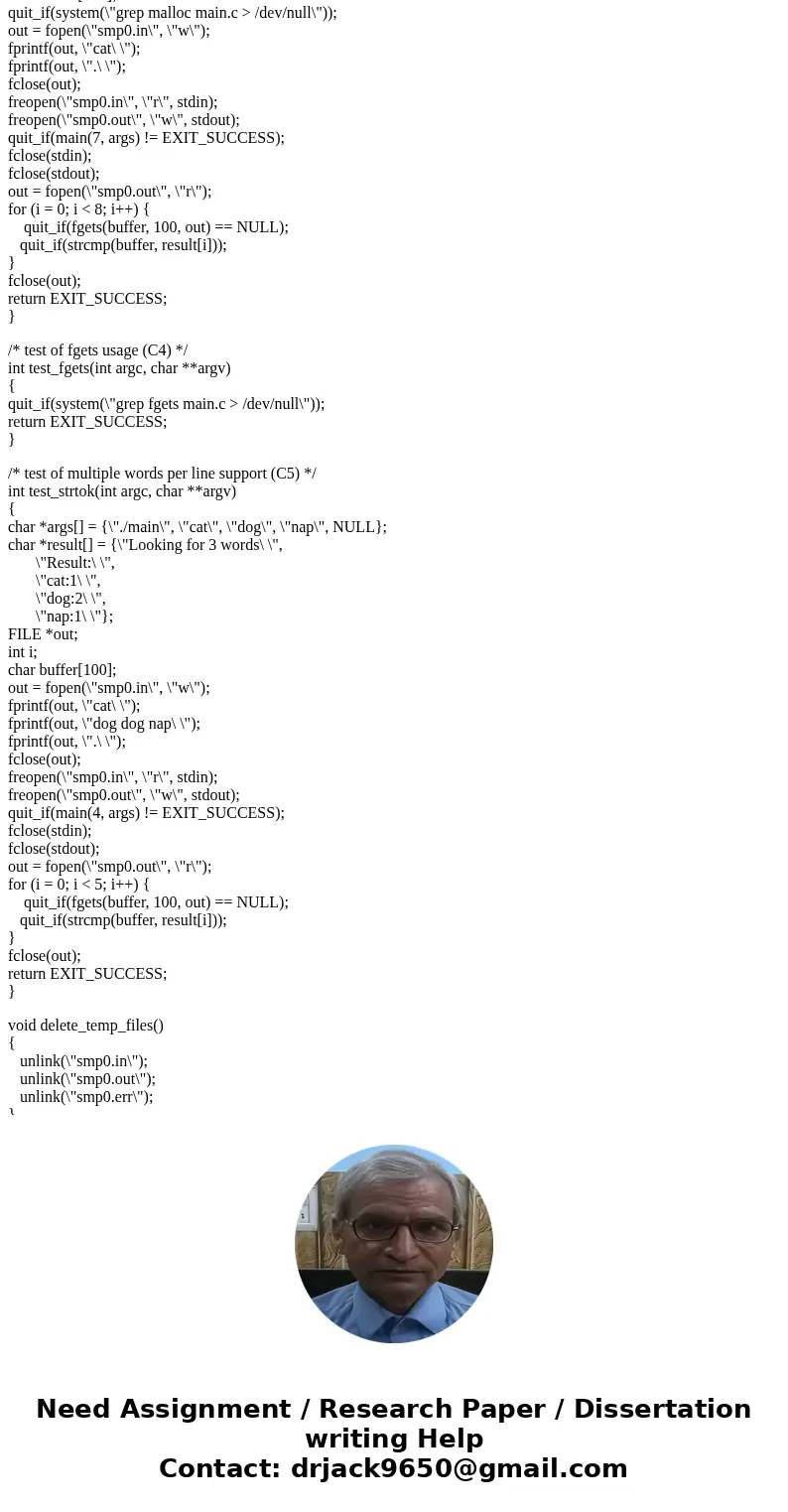
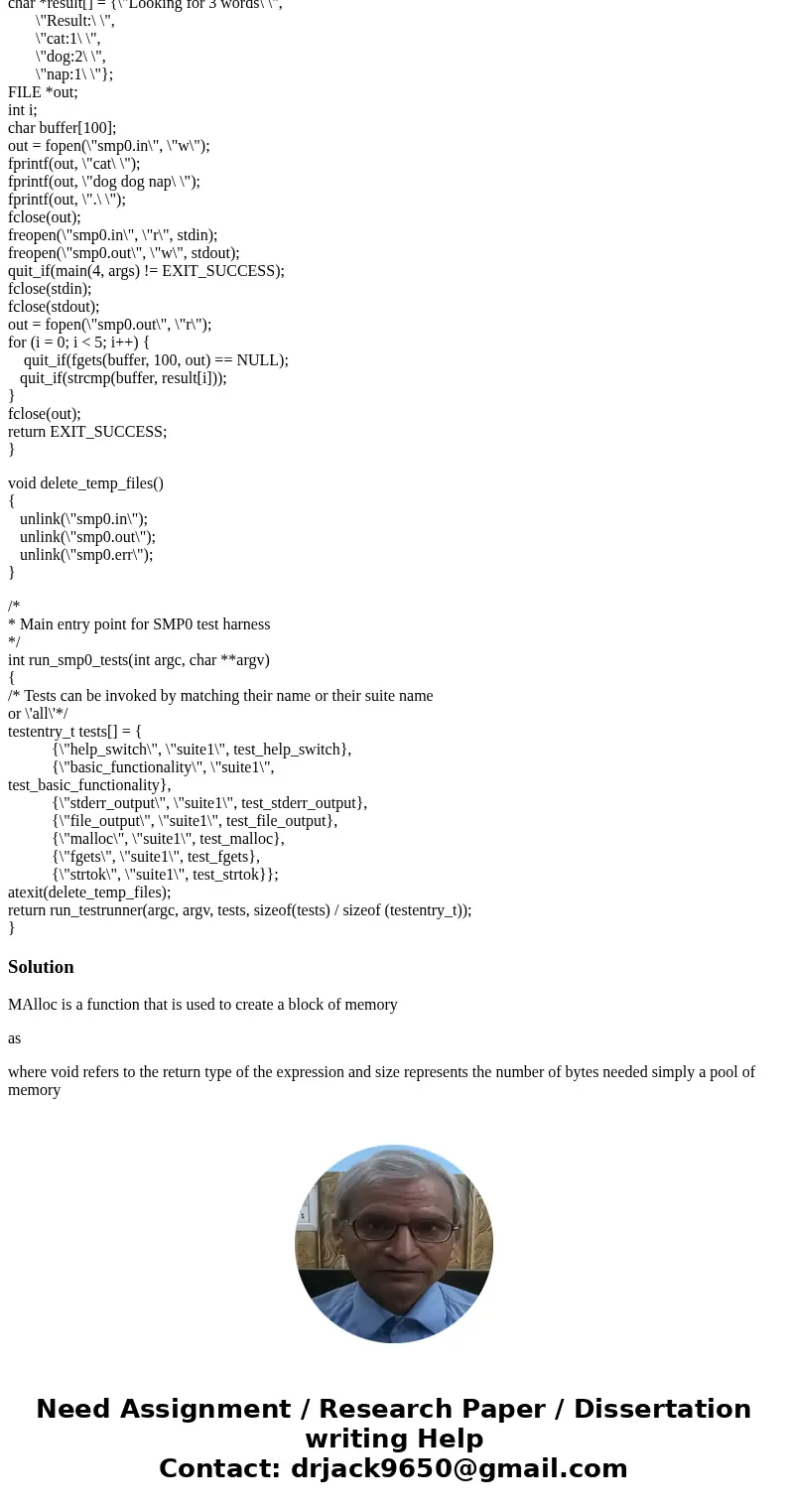
 Homework Sourse
Homework Sourse